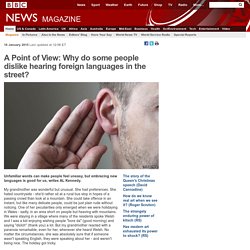

Linguists are like, ‘Get used to it!’ In recent months, Senator Kirsten Gillibrand has used it; musician Buddy Guy has used it; Ferguson police officer Darren Wilson used it in grand jury testimony, as did his victim Michael Brown’s friend Dorian Johnson.

How language changes over time. The Lingua File: How French Gave English Its Sophisticated Words. If you're familiar with the history of the British Isles, you'll be aware that before taking the English language on tour and invading 90% of the world (with varying degrees of success), the British were the whipping boys of Europe and every empire across Europe had a go of taking over Great Britain.

This helps explain why the English language is widespread and has a diverse lexicon with roots in many different languages. What I find most interesting is the relationship between the origin of a word in English and its register. That_s_so_bae_not_just_a_noun_anymore_here_s_how_bae_gets_used_as_a_verb. i100.independent.co. A Point of View: Why do some people dislike hearing foreign languages in the street? 16 January 2015Last updated at 12:06 ET Unfamiliar words can make people feel uneasy, but embracing new languages is good for us, writes AL Kennedy.

My grandmother was wonderful but unusual. She had preferences. She hated countryside - she'd rather sit at a rural bus stop in hopes of a passing crowd than look at a mountain. She could take offence in an instant, but like many delicate people, could be just plain rude without noticing. Words With Changed Meaning. Where do our words come from? 1. Sushi has become one of the most familiar Japanese words in contemporary English. 9 Old-Fashioned Tech Terms You Still Use Today. You probably don't remember the last time you actually "dialed" a phone number, but you might remember the last time you said you did. Old terminology dies hard. Though technology changes swiftly from day to day, there are still old-fashioned terms we cling to, using them frequently even though they no longer have a relevant meaning.
We "tune in" to the "tube," all with the aid of the trusty "clicker. " Unless you're a Luddite exclusively using obsolete technology, you'll recognize these nine ancient tech terms as relics of a bygone era. The English expressions coined in WW1. After the introduction of conscription in 1916, the distinction between soldiers and civilians became less clear, and vocabulary passed readily from one group to the other.

This is the case with a number of words borrowed from Indian languages by the British military in the 19th Century, perhaps the most well-known of which is Blighty. The Urdu words vilayat ("inhabited country", specifically Europe or Britain) and vilayati ("foreign", or "British, English, European") were borrowed by the British in the 19th Century.
Both are still used in South Asian English. The English Language A2 Blog: Language Change. OF COURSE LANGUAGE CHANGES.

BUT WHY? Well, no one knows for sure. But what we do know is that changes rarely happen overnight. People do not wake up one morning and decide to use the word ‘beef’ instead of ‘ox meat’ (but they might wake up and coin a new word!). Generally, language changes are gradual, particularly changes in the phonological (sound) and syntactic (grammar) systems. You Heard ’Em Here First: A Forecast of New Words in 2015. As 2015 tiptoes in, can we guess which new words we will be casually tossing around this time next year?

“You can never predict the future with language,” the British linguist David Crystal has said. He’s probably right, but let’s try anyway. For starters, we can look at a few quixotic attempts to popularize new words and see where they might have gone awry. 11 Words Which Are Older Than You Think. English rude word enters German language. Franglais row: Is the English language conquering France? The French parliament is debating a new road map for French universities, which includes the proposal of allowing courses to be taught in English.

For some, this amounts to a betrayal of the national language and, more specifically, of a particular way at looking at the world - for others it's just accepting the inevitable. It all started with a faux-pas - to use a French phrase commonly borrowed by English-speakers. On 20 March, when French higher education minister Genevieve Fioraso unveiled the proposed road map, she mentioned that there were only 3,000 Indian students in France. In order to attract more foreign students, she added, French universities would have to start offering courses taught in English.
Linguists identify words that have changed little in 15,000 years. Neanderthal, cro-magnon, modern man may have shared words which remain to this day.

Photo: Monique Westermann You, hear me! Give this fire to that old man. Pull the black worm off the bark and give it to the mother. A profusion of words. Please note: several of the following links to dictionary content require subscriber access to the OED Online.

The early modern period was an era of great change for the English language. According to the OED’s record, the number of words ‘available’ to speakers of English more than doubled between 1500 and 1650. Many of the new words were borrowed into English from the Latin or Greek of the Renaissance (for example, hypotenuse), or from the far-off countries visited by travellers and traders (e.g. pangolin), and must have seemed hard to understand to many of the population.
At the same time, there were significant demographic shifts in Britain towards an urbanized culture based in the big cities, such as London: the population of London increased eightfold over these years. Monolingual dictionaries were preceded, both in Britain and in continental Europe, by bilingual dictionaries, which served a more immediately practical need. ‘Hard word’ dictionaries. Besides the pope, who speaks Latin today? Braggadocious? Never. Just excited about the Oxford Dictionaries February 2013 update! Interview: Christine Ammer, Author Of 'The American Heritage Dictionary Of Idioms' Hide captionThe "elephant in the room" is something obvious that can't be overlooked, even if no one is talking about it.

The phrase was in use as early as 1935. Manx: Bringing a language back from the dead. 30 January 2013Last updated at 19:47 ET A Manx dictionary on the Isle of Man flag Condemned as a dead language, Manx - the native language of the Isle of Man - is staging an extraordinary renaissance, writes Rob Crossan. Road signs, radio shows, mobile phone apps, novels - take a drive around the Isle of Man today and the local language is prominent. First Known Use Of OMG In Letter To Winston Churchill (PHOTO) Catfish: How Manti Te’o’s imaginary romance got its name - Ideas.
Amazeballs to Zing: new words added to Collins online dictionary. British children 'turn to American English' 29 May 2012Last updated at 09:24 ET Argentine footballer Lionel Messi was among the famous people mentioned British children are increasingly using American English in their writing, according to a report based on entries to a BBC short story competition.
Oxford University Press studied around 74,000 entries for Radio 2's 500 Words contest. Americanisms such as cupcake, garbage truck, trash can, candy, sidewalk and soda were found in many of the entries. Wayne Rooney's baby Klay and the trend for K-names. 21 May 2013Last updated at 23:37 ET By Vanessa Barford BBC News Magazine Klay, Wayne, Kai and Coleen Rooney Footballer Wayne Rooney and his wife Coleen have called their second son Klay. Britishisms and the Britishisation of American English. There is little that irks British defenders of the English language more than Americanisms, which they see creeping insidiously into newspaper columns and everyday conversation. But bit by bit British English is invading America too. Are 'geek' and 'nerd' now positive terms? 15 November 2012Last updated at 20:07 ET By Kathryn Westcott BBC News Magazine. The trench talk that is now entrenched in the English language. Trench Talk: Words of the First World War: Amazon.co.uk: Peter Doyle, Julian Walker.
New York, a graveyard for languages. 15 December 2012Last updated at 19:13 ET By Dr Mark Turin Linguist and broadcaster. 10 Words That Started Out as Errors. Language change is driven by mistakes. Why do pigs oink in English, boo boo in Japanese, and nöff-nöff in Swedish? Why do we have silent letters in the English language? - Features - Books. Grant Barrett: Top buzzwords and phrases of 2014. Snips of language are buzzy little things, some sharp, some camouflaged, each remarkable for a time in our ears and mouths and minds.